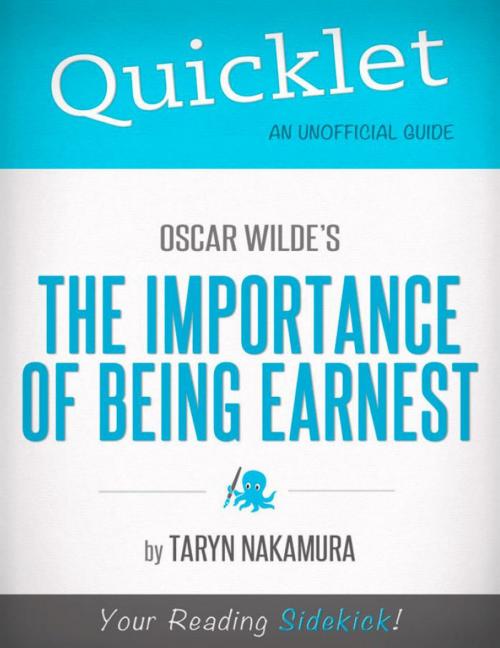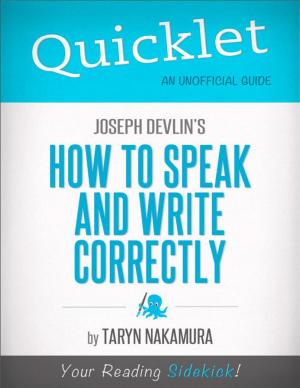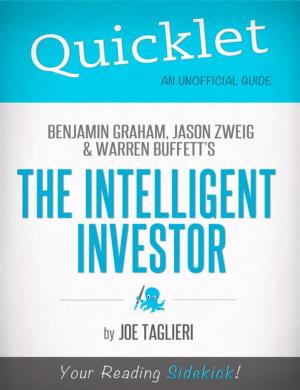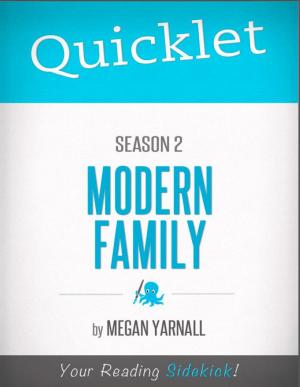Quicklet On Oscar Wilde's The Importance of Being Earnest
Nonfiction, Reference & Language, Study Aids, Book Notes, Art & Architecture, General Art| Author: | Taryn Nakamura | ISBN: | 9781614641681 |
| Publisher: | Hyperink | Publication: | February 12, 2012 |
| Imprint: | Hyperink | Language: | English |
| Author: | Taryn Nakamura |
| ISBN: | 9781614641681 |
| Publisher: | Hyperink |
| Publication: | February 12, 2012 |
| Imprint: | Hyperink |
| Language: | English |
ABOUT THE BOOK
The Importance of Being Earnest is one of the few books that actually makes me laugh out loud. Or tremor silently, if I’m reading in public. From witty one-liners on marriage, to solemn cake- and muffin-eating, Oscar Wilde surprised me with quick humor in almost every sentence.
But I have to admit, when I read the last sentence, I found myself flipping through the final pages looking to see if my book was missing pages. It just didn’t seem complete. Somehow, the couples forgive each other, and Cecily takes Algernon despite his imperfect name.
For me, the problem with the play is that I was not entirely sure what Oscar Wilde was trying to say. He lampoons society and mocks conventions, but once he’s finished tearing it apart, there’s nothing left. He offers no substitute for the lovers with fleeting emotions and shallow attachments. There’s no hope for trust in relationships, lasting marriages, or happy couples. And that’s where it gets scary.
Miss Prism says in Act II, “A misanthrope I can understand—a womanthrope, never!” I felt that despite his levity, Oscar Wilde was a misanthrope who saw little hope in the creation of a better society. Just look at his own personal life. He played along as a devoted family man, but he led a double life as a gay lover. When he did finally find a partner, he was imprisoned by a society that couldn’t accept homosexuality.
Although The Importance of Being Earnest kept me laughing the whole time, it never took me from “Wow, people suck” to “Maybe we can change.”
But maybe that’s Wilde’s point. He would probably tell me to stop being so earnest.
MEET THE AUTHOR
Taryn Nakamura was born and raised in Hawaii, where she's recently returned after receiving a B.A. in English at Yale University. As a writing concentrator at Yale, she focused on fiction, but as a Hyperink writer, she's learned that nonfiction can also be fun. In her free time, she likes to run at a walking pace, haunt libraries, and eat pickles.
EXCERPT FROM THE BOOK
Oscar Wilde may have died an outcast in 1900, but today, his fans commemorate him with countless lipstick kisses on his grave. The kissers have gone too far, it turns out. Oscar Wilde’s Paris monument is now protected by a glass barrier and a 9,000-euro fine.
Oscar Wilde was born in Dublin in 1854. His father was a surgeon and his mother was a nationalist poetess, who wrote radical poetry under the name, Speranza. Wilde attended Trinity College and Oxford University.
Wilde dabbled in poetry, fiction, and drama, and he wrote both tragedy and comedy. He also wrote The Picture of Dorian Gray, Lady Windemere’s Fan, A Woman of No Importance, and An Ideal Husband.
In Henry Popkin’s introduction to the 1965 Avon edition of The Importance of Being Earnest, Popkin writes that Wilde cultivated a persona as a dandy. Wilde was accustomed to wearing knee breeches, silk stockings, and a sunflower or lily to complete the outfit.
Wilde married Constance Llyod in 1884, and they had two sons. As Gregory Wheatcroft writes in The Atlantic Monthly, W. H. Auden considered Wilde’s marriage “perhaps the only really heartless act of Wilde’s life.” But unlike Auden, Wilde probably didn’t realize his true sexual preferences until later in life. Merlin Holland writes in The Guardian that Wilde’s first known male lover was Robert Ross in 1886 or 1887.
Oscar Wilde’s love affair with Lord Alfred Douglas, also known as Bosie, exploded into the public arena in 1895. With Bosie’s encouragement, Wilde sued Bosie’s father for calling Wilde a “Sodomite.” The Marquis of Queensbury bit back and brought Wilde to court for gross indecency. Oscar Wilde spent 2 years in jail for sodomy.
Buy a copy to keep reading!
ABOUT THE BOOK
The Importance of Being Earnest is one of the few books that actually makes me laugh out loud. Or tremor silently, if I’m reading in public. From witty one-liners on marriage, to solemn cake- and muffin-eating, Oscar Wilde surprised me with quick humor in almost every sentence.
But I have to admit, when I read the last sentence, I found myself flipping through the final pages looking to see if my book was missing pages. It just didn’t seem complete. Somehow, the couples forgive each other, and Cecily takes Algernon despite his imperfect name.
For me, the problem with the play is that I was not entirely sure what Oscar Wilde was trying to say. He lampoons society and mocks conventions, but once he’s finished tearing it apart, there’s nothing left. He offers no substitute for the lovers with fleeting emotions and shallow attachments. There’s no hope for trust in relationships, lasting marriages, or happy couples. And that’s where it gets scary.
Miss Prism says in Act II, “A misanthrope I can understand—a womanthrope, never!” I felt that despite his levity, Oscar Wilde was a misanthrope who saw little hope in the creation of a better society. Just look at his own personal life. He played along as a devoted family man, but he led a double life as a gay lover. When he did finally find a partner, he was imprisoned by a society that couldn’t accept homosexuality.
Although The Importance of Being Earnest kept me laughing the whole time, it never took me from “Wow, people suck” to “Maybe we can change.”
But maybe that’s Wilde’s point. He would probably tell me to stop being so earnest.
MEET THE AUTHOR
Taryn Nakamura was born and raised in Hawaii, where she's recently returned after receiving a B.A. in English at Yale University. As a writing concentrator at Yale, she focused on fiction, but as a Hyperink writer, she's learned that nonfiction can also be fun. In her free time, she likes to run at a walking pace, haunt libraries, and eat pickles.
EXCERPT FROM THE BOOK
Oscar Wilde may have died an outcast in 1900, but today, his fans commemorate him with countless lipstick kisses on his grave. The kissers have gone too far, it turns out. Oscar Wilde’s Paris monument is now protected by a glass barrier and a 9,000-euro fine.
Oscar Wilde was born in Dublin in 1854. His father was a surgeon and his mother was a nationalist poetess, who wrote radical poetry under the name, Speranza. Wilde attended Trinity College and Oxford University.
Wilde dabbled in poetry, fiction, and drama, and he wrote both tragedy and comedy. He also wrote The Picture of Dorian Gray, Lady Windemere’s Fan, A Woman of No Importance, and An Ideal Husband.
In Henry Popkin’s introduction to the 1965 Avon edition of The Importance of Being Earnest, Popkin writes that Wilde cultivated a persona as a dandy. Wilde was accustomed to wearing knee breeches, silk stockings, and a sunflower or lily to complete the outfit.
Wilde married Constance Llyod in 1884, and they had two sons. As Gregory Wheatcroft writes in The Atlantic Monthly, W. H. Auden considered Wilde’s marriage “perhaps the only really heartless act of Wilde’s life.” But unlike Auden, Wilde probably didn’t realize his true sexual preferences until later in life. Merlin Holland writes in The Guardian that Wilde’s first known male lover was Robert Ross in 1886 or 1887.
Oscar Wilde’s love affair with Lord Alfred Douglas, also known as Bosie, exploded into the public arena in 1895. With Bosie’s encouragement, Wilde sued Bosie’s father for calling Wilde a “Sodomite.” The Marquis of Queensbury bit back and brought Wilde to court for gross indecency. Oscar Wilde spent 2 years in jail for sodomy.
Buy a copy to keep reading!















